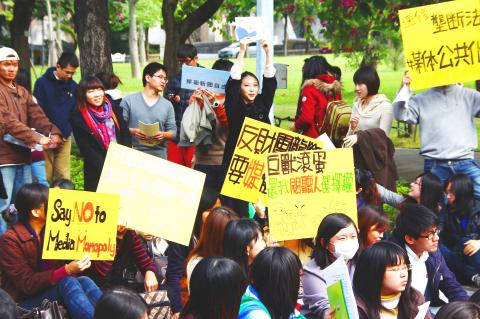National Communications Commission (NCC) Chairman Howard Shyr (石世豪) yesterday said the commission’s ruling on Want Want China Times Group’s purchase of cable TV services owned by China Network Systems (CNS) remain unchanged and that the transaction would not take effect until the group fulfilled each and every requirement issued by the commission.
Shyr made the comments during a review at the legislature’s Transportation Committee of how Want Want China Times Group plans to fulfill the requirements.
The preconditions include that group chairman Tsai Eng-meng (蔡衍明) and his family members, as well as his business associates in the deal, must completely dissociate themselves from the operation of CtiTV News. In addition, China Television’s (CTV) digital news channel must be turned into a non-news channel. As a TV network, CTV must have an independent editorial system as well.

Photo: Lin Yi-chang, Taipei Times
“The commission has already ruled on the case [Want Want-CNS deal] and the ruling has already been delivered [Want Want],” Shyr said. “Both the group and the commission are bound by the ruling.”
Shyr confirmed that the group has already filed an administrative lawsuit against the commission over these requirements.
Despite the pending lawsuit, the group still needs to fulfill these requirements for the transaction to take effect, he said.
Taiwan Solidarity Union Legislator Hsu Chung-hsin (許忠信) asked if the Tsai family could place the shares they own in CTiTV News under a third-party trustee to meet the commission’s requirement. Shyr said the method may only change the nominal ownership of the asset, adding that the commission will determine if Tsai has indeed cut off his relations with CTiTV News.
President Ma Ying-jeou (馬英九) said on Tuesday during the release of the nation’s first human rights report in English that he did not want the media in the nation to present only one viewpoint.
Hsu asked Shyr for his views on Ma’s remarks, adding that his personal interpretation was that Ma did not want Taiwan to become a “heaven for pro-China opinions.”
Hsu said the issue of China’s acquisition of Taiwanese media should be addressed as a matter of national security.
In response, Shyr said the last thing a democratic country wanted was to have its media convey only one viewpoint.
Should the media acquisition involve national security issues, the commission would work closely with relevant government agencies, he said.
Chinese Nationalist Party (KMT) Legislator Yang Li-huan (楊麗環) asked Shyr if he thought that certain groups have indeed monopolized the operations of the nation’s media outlets. Shyr said that owning more media outlets gives a media group more economic power. However, he said that that this did not mean that the group could have absolute control over the expression of public opinion.
“Public opinion in Taiwan is very diverse and has multiple ways to be expressed,” he said. “The student protests against media monopolization, for example, were organized through online media.”
Shyr also said that research on media monopolization mainly focused on whether it hindered exposure to certain opinions or news, or how the media group utilizes the advantage to create certain trends.

Alain Robert, known as the "French Spider-Man," praised Alex Honnold as exceptionally well-prepared after the US climber completed a free solo ascent of Taipei 101 yesterday. Robert said Honnold's ascent of the 508m-tall skyscraper in just more than one-and-a-half hours without using safety ropes or equipment was a remarkable achievement. "This is my life," he said in an interview conducted in French, adding that he liked the feeling of being "on the edge of danger." The 63-year-old Frenchman climbed Taipei 101 using ropes in December 2004, taking about four hours to reach the top. On a one-to-10 scale of difficulty, Robert said Taipei 101

Nipah virus infection is to be officially listed as a category 5 notifiable infectious disease in Taiwan in March, while clinical treatment guidelines are being formulated, the Centers for Disease Control (CDC) said yesterday. With Nipah infections being reported in other countries and considering its relatively high fatality rate, the centers on Jan. 16 announced that it would be listed as a notifiable infectious disease to bolster the nation’s systematic early warning system and increase public awareness, the CDC said. Bangladesh reported four fatal cases last year in separate districts, with three linked to raw date palm sap consumption, CDC Epidemic Intelligence

US climber Alex Honnold left Taiwan this morning a day after completing a free-solo ascent of Taipei 101, a feat that drew cheers from onlookers and gained widespread international attention. Honnold yesterday scaled the 101-story skyscraper without a rope or safety harness. The climb — the highest urban free-solo ascent ever attempted — took just more than 90 minutes and was streamed live on Netflix. It was covered by major international news outlets including CNN, the New York Times, the Guardian and the Wall Street Journal. As Honnold prepared to leave Taiwan today, he attracted a crowd when he and his wife, Sanni,

Taiwanese and US defense groups are collaborating to introduce deployable, semi-autonomous manufacturing systems for drones and components in a boost to the nation’s supply chain resilience. Taiwan’s G-Tech Optroelectronics Corp subsidiary GTOC and the US’ Aerkomm Inc on Friday announced an agreement with fellow US-based Firestorm Lab to adopt the latter’s xCell, a technology featuring 3D printers fitted in 6.1m container units. The systems enable aerial platforms and parts to be produced in high volumes from dispersed nodes capable of rapid redeployment, to minimize the risk of enemy strikes and to meet field requirements, they said. Firestorm chief technology officer Ian Muceus said